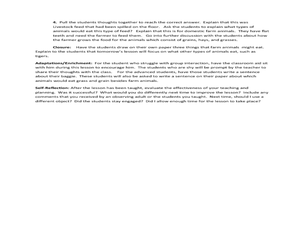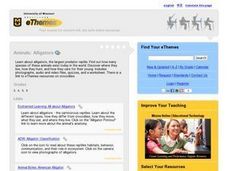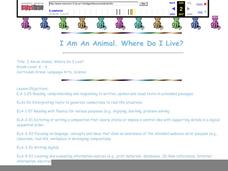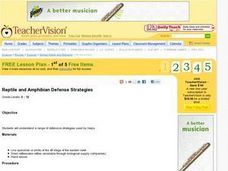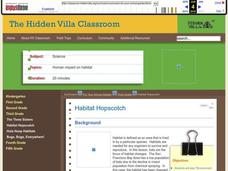Curated OER
Baa, Ram, Ewe.... Sheep Tales
Pupils explore animal characteristics by reading animal stories in class. In this sheep habitat lesson, students identify the uses for sheep in our agricultural based society and the importance of wool in our economy. Pupils read several...
Curated OER
What's in it and Who Eats it?
First graders explore farming by illustrating images. In this livestock activity, 1st graders discuss what types of plants are used to feed livestock animals and how pets and humans eat the livestock animals. Students draw images of what...
Curated OER
Animals: Alligators
Learners study alligators, discover their habitats, species and how they care for their young.
Curated OER
I Am An Animal: Where Do I Live?
Students make an alphabet booklet using the computer to find pictures and facts about farm animals, zoo animals and pets. They write facts about the animals: where they live, what they eat, their coloring, etc.
Redefining Progress
Have and Have-Not
Is there a correlation between a country's wealth and the extent of its ecological footprint? What exactly constitutes an ecological footprint, and how does one country stack up against the rest? This is a unique instructional activity...
Curated OER
Farming Number 6
In this environment worksheet, students identify and explain the importance of water and farming. They identify the differences between food items and whether they are a fruit, vegetable, or animal. Students also respond to 5 yes/no...
Curated OER
Thank You For the Food We Eat
Young scholars explore where our food comes from. In this science instructional activity, students discuss how much of our food comes from animals. Young scholars construct a mobile.
Curated OER
Pen Pals
Students discuss the sounds that different animals make. Then they play a listening game, using the animal sounds they've discussed.
SeaWorld
Bird Biology
Here you will find two good activities designed for young learners. In the first one, pupils explore the fact that all birds have feathers, and they discover what two uses those feathers have. After the discussion, the kids color in a...
Curated OER
Wild Or Domestic?
Students discuss differences between wild and domestic animals. They list animals on chart paper, and then cut out pictures from magazines to create large collage showing wild and domestic animals.
Curated OER
Getting To Know You:learning the Aza Ssp Terminology
Students discover the role zoos play in conservation of animals. They research the captive breeding programs that are in place at the Minnesota Zoo. They use the zoo's website to find the American Zoo and Aquarium Associations criteria...
Curated OER
The Ant Attack
Third graders observe the daily activity of an ant farm. Through observations and journal writing, they gather data concerning the daily activities of the ants. Students use their observations to predict the effect of environmental...
Curated OER
Agriculture in Motion
Youngsters learn about simple machines that could be used on a farm. They learn about agricluture, listen to a farmer speak, compare and contrast different farm machines, and then design their own. Note that although the publisher...
Curated OER
Where Do Eggs Come From?
Students study the many characteristics that they share with other animals and how those characteristics relate to the proper care of animals. Students also study facts about chickens and chicken-related vocabulary. Finally, they study...
Curated OER
The Long Road to Coffee
Students organize picture cards of the sequene of how food gets from a farm to their home. They then sequence cards of how coffee grown in Colombia gets to their home comparing the differences.
Curated OER
Reptile and Amphibian Defense Strategies
Students study the stages of the Eastern newt either by collecting a live specimen or from pictures. They note the colors of the eft stage before reading the "Eastern Newt Species Account" that shows the newt's life stages, migration,...
Curated OER
Stormy Weather
Fifth graders demonstrate their knowledge for how animals survive in natural environments when a storm occurs. For this science/writing lesson, 5th graders engage in a listening activity with the teacher. Additionally, students write a...
Curated OER
From Forest to Farm to Urban Forest
Students participate in a group discuss revolving around urban development and their answers to worksheet questions. They analyze maps and historical records to compare and contrast the day to day activities of a forest manager.
Organic Farming
Four Seasons
Celebrate the changing of the seasons with this collection of arts and crafts activities.
GiggleUp Kids
Happy Little Farmer
Pre-readers and primaries can help farmer rabbit to plant some delicious fruits and vegetables. From soil preparation and pest control, all the way to the harvest, little ones participate in the entire process!
Scholastic
Minibeasts
Lead young scientists to discover insects outdoors. After investigating, students will record observations, learn about these fascinating creatures, craft, and role play.
Curated OER
Cats: Reading Comprehension
In this reading comprehension worksheet, 2nd graders will read a paragraph about cats and answer four multiple choice questions about the passage.
Curated OER
Habitat Hopscotch
Third graders explore animal characteristics by participating in a bat environment game. In this natural habitat lesson, 3rd graders identify the physical anatomy of a bat and discuss their eating and sleeping habits. Students conduct a...
Curated OER
Chicken
In this chicken coloring page worksheet, students study a line drawing of a large chicken. There are no directions; this appears to be a coloring page.



